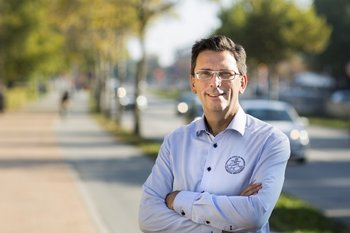The administration to play key role in new climate initiatives
In spring, AU announced its ambitious climate strategy; now work is beginning to bring the strategy to life. Already this autumn, the first green projects will be rolled out, and several technical and administrative employees will be playing a central role in getting the strategy off to a good start.
I hope you've all had a great summer holiday - and that you've settled in at work again, even if COVID-19 is once more affecting all of us, at work and at home. In the management team, we're monitoring the coronavirus situation very carefully, and employees can keep up-to-date via the AU corona site.
Although COVID-19 is still lurking among us - and will do so for a very long time to come - this autumn we’ll be working in earnest on a project that is hugely important for the university: Implementation of our ambitious climate strategy, which was approved by the board earlier in the year.
In the spring, we took the first important steps toward a greener university. Among other things, we've transitioned to wind power electricity, and we've experimented with 'smart buildings' to optimise energy consumption. And, finally, sustainability has become an essential criterion in our ongoing tendering procedure for cafeteria services. We have a number of exciting initiatives on the drawing board for the autumn.
New initiatives to be launched
More specifically, from now and until the end of the year, we're setting in motion a number of centrally anchored activities that were adopted recently under the action plans for the AU climate strategy. Many of our technical and administrative employees will come to play a key role in carrying out these activities.
In the procurement area, we're going to develop a concept for how to take account of the climate when putting services out for tender. And in the waste area, we're going to develop a more efficient separation system, so that we can contribute to the green transition here too.
We'll be introducing a fixed temperature of 21 degrees Celsius in AU buildings across campus during months when heating is required. This will help reduce our climate footprint from heating. We’ll also be examining whether we can close energy-intensive laboratories during the night, as well as the possibilities to establish an energy research park in Foulum.
Finally, within the transport area, among other things, we’re going to develop a green guide for climate-friendly transport. Since, as you know, air transport is the source of serious carbon emissions.
In other words, we've got lots in store for this autumn. The common denominator for most of these activities is that we in the administration will be designing and defining them – and we'll also be responsible for setting them in motion, so that we can take the first concrete steps towards fulfilling our climate ambitions.
I’m looking forward to the process, and I'm glad that we have the opportunity contribute to this important work.
At faculty level, the autumn will be spent supplementing with local action plans in the climate area, to be realised in 2021. I'm looking forward to following this hugely important work to promote and realise the climate strategy in all academic environments.
We have to talk about the dilemmas
I’m very aware that, in our work on the climate strategy, we must not be blind to the dilemmas implicit in our activities.
For example, how can we get reductions in air travel to align with more internationalisation, which is another important ambition for the university? And will closing the labs at night also restrict researchers' opportunities to work at all times of the day? How will people react to a fixed temperature on campus of 21 degrees? We know that this kind of initiative is not always popular, but what if the benefits are a significant reduction in carbon emissions?
In order to address these dilemmas, we must continuously learn from our work and the experiences with climate measures. Therefore, I’d like to encourage you to talk about these issues locally – and to share any experiences and ideas with the rest of the university, for example via the #AUSustainability network, which is open to all employees. You’re also always welcome to send input directly to me at this email address.
I look forward to an autumn when I hope we’ll not only be talking about the coronavirus at Aarhus University, but also very much about the climate and our initiatives to reduce carbon emissions.
